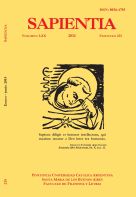Please use this identifier to cite or link to this item:
https://repositorio.uca.edu.ar/handle/123456789/3845| Título: | Aspectos fundamentales del acto libre en el pensamiento de Santo Tomás de Aquino | Autor: | Ocampo Ponce, Manuel | Palabras clave: | Tomás de Aquino, Santo, 1225?-1274; FILOSOFIA; LIBERTAD; ACTO HUMANO | Fecha de publicación: | 2014 | Editorial: | Pontificia Universidad Católica Argentina. Facultad de Filosofía y Letras | Cita: | Ocampo Ponce, M. Aspectos fundamentales del acto libre en el pensamiento de Santo Tomás de Aquino [en línea]. Sapientia. 2014, 70 (235). Disponible en: https://repositorio.uca.edu.ar/handle/123456789/3845 | Resumen: | Resumen: Es un hecho que Dios ha impreso de un modo necesario e indefectible la dirección hacia su fin a las creaturas materiales y a las creaturas espirituales incluido el caso concreto del hombre. Pero también es un hecho que en el mundo corpóreo, la persona humana cuenta con la libertad de los medios para alcanzar dicho fin. En esto se distingue el hombre de los animales irracionales, en que la naturaleza espiritual y libre ha de ser encauzada en su actividad por una ley específicamente distinta a la del mundo irracional, que a la vez de conducirla eficazmente hacia su fin, sea compatible con la libertad. Dada la relevancia de este tema para la comprensión del problema moral del hombre, el objeto de este trabajo es profundizar en la naturaleza del acto libre y por ende en los principios que fundamentan la libertad en el pensamiento de Santo Tomás de Aquino quien sin lugar a duda ha logrado una gran profundidad en el análisis del acto humano. Abstract: God has impressed upon both material and spiritual creatures, including the concrete case of man, a necessary and indefectible direction towards their end. But at the same time, in the corporeal world, the human person possesses a special freedom with regard to the means whereby to reach that end. This is precisely what distinguishes man from irrational animals: that our free and spiritual nature must be directed in its activity by a law specifically distinct from that of the irrational world, such that, while it drives us towards our end, it remains compatible with free will. Given the relevance of this theme for the understanding of the moral problem of the human person, the goal of this work is to delve more deeply into the nature of free human acts and therefore into the foundational principles of free will in the thought of St. Thomas Aquinas, who undoubtedly has offered a profound analysis of human acts. |
URI: | https://repositorio.uca.edu.ar/handle/123456789/3845 | Disciplina: | FILOSOFIA | Derechos: | Acceso Abierto | Fuente: | Sapientia. 2014, 70 (235) |
| Appears in Collections: | SAP - 2014 Vol LXX nro. 235 |
Files in This Item:
| File | Description | Size | Format | |
|---|---|---|---|---|
| aspectos-fundamentales-acto-libre.pdf | 211,76 kB | Adobe PDF |  View/Open |
Page view(s)
1,578
checked on Apr 30, 2024
Download(s)
4,295
checked on Apr 30, 2024
Google ScholarTM
Check
This item is licensed under a Creative Commons License

